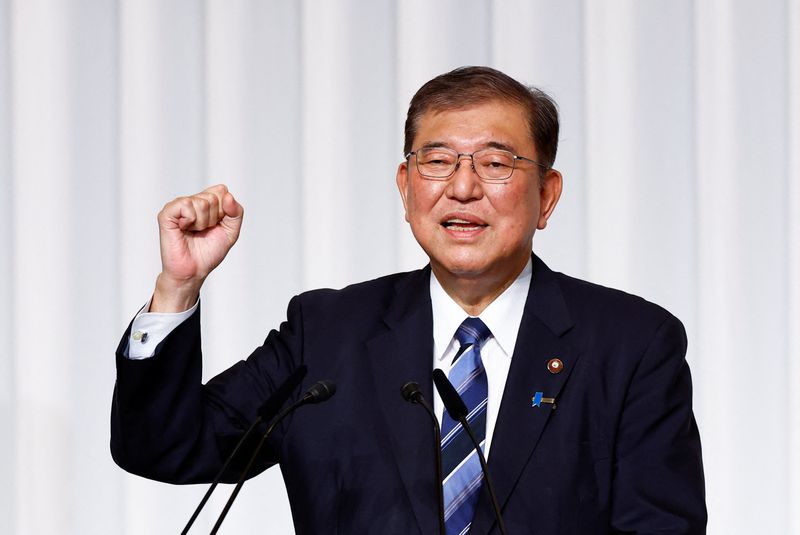Japan’s incoming PM Ishiba calls election for Oct 27, seeks to unify party
2024.09.30 03:12
TOKYO (Reuters) -Japan’s incoming prime minister, Shigeru Ishiba, said on Monday he will call a general election for Oct. 27 following his victory in one of the closest ever leadership races for the ruling Liberal Democratic Party.
The poll, which will come a year early and ahead of the U.S. presidential election in November, will decide which party controls parliament’s lower house. Lawmakers there will meet tomorrow to confirm him as the country’s next prime minister.
“It is important for the new administration to be judged by the people as soon as possible,” Ishiba said at a press conference at LDP headquarters in Tokyo.
Japanese shares fell more than 4% in early trading on Monday as the yen strengthened and Japanese government bonds jumped in reaction to the leadership win by Ishiba, who is seen as a monetary policy hawk.
Ishiba on Monday began picking government and party officials who will contest the upcoming general election with him.
So far those include two rival candidates in the leadership race, Katsunobu Kato as finance minister and Yoshimasa Hayashi to stay on as chief cabinet secretary, a pivotal post that includes the role of top government spokesman, two sources familiar with the appointments earlier told Reuters.
A close Ishiba ally, Takeshi Iwaya, a former defence chief, will take over as foreign minister, while Gen Nakatani will return to the defence ministry, a position he held in 2016, said the sources, who asked not to be identified because they are not authorized to speak to the media, confirming earlier media reports.
Yoji Muto, a former junior minister, will take charge at the economy, trade and industry ministry, a separate source said.
Not included in his picks, however, is Sanae Takaichi, the hardline conservative he beat by 215 votes to 194 on Friday in the closest leadership election in almost seven decades.
Takaichi’s absence could make it difficult for Ishiba to manage a fractious ruling group roiled by scandals that have sapped its public support.
Media reports that Takaichi has declined a post “could point to a weakness in Ishiba’s support base, which could cause him problems going forward,” said Hiroshi Shiratori, a political science professor at Hosei University in Tokyo.
Ishiba picked another rival, Shinjiro Koizumi, as his election campaign chief, along with former Prime Minister Yoshihide Suga, a Koizumi backer, who is the party’s new vice president. Both joined him at his press conference on Monday.

Ishiba, 67, won the LDP leadership race on his fifth attempt with strong backing from rank-and-file members.
He is however, considered something of troublemaker by many of his parliamentary colleagues for often defying party policy. On Friday before his run off election against Takaichi he apologised to LDP lawmakers for his “shortcomings”.








